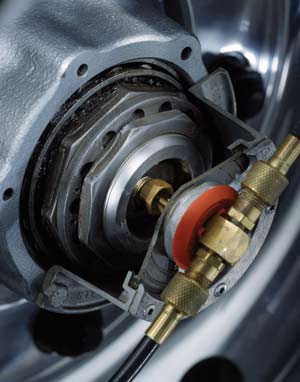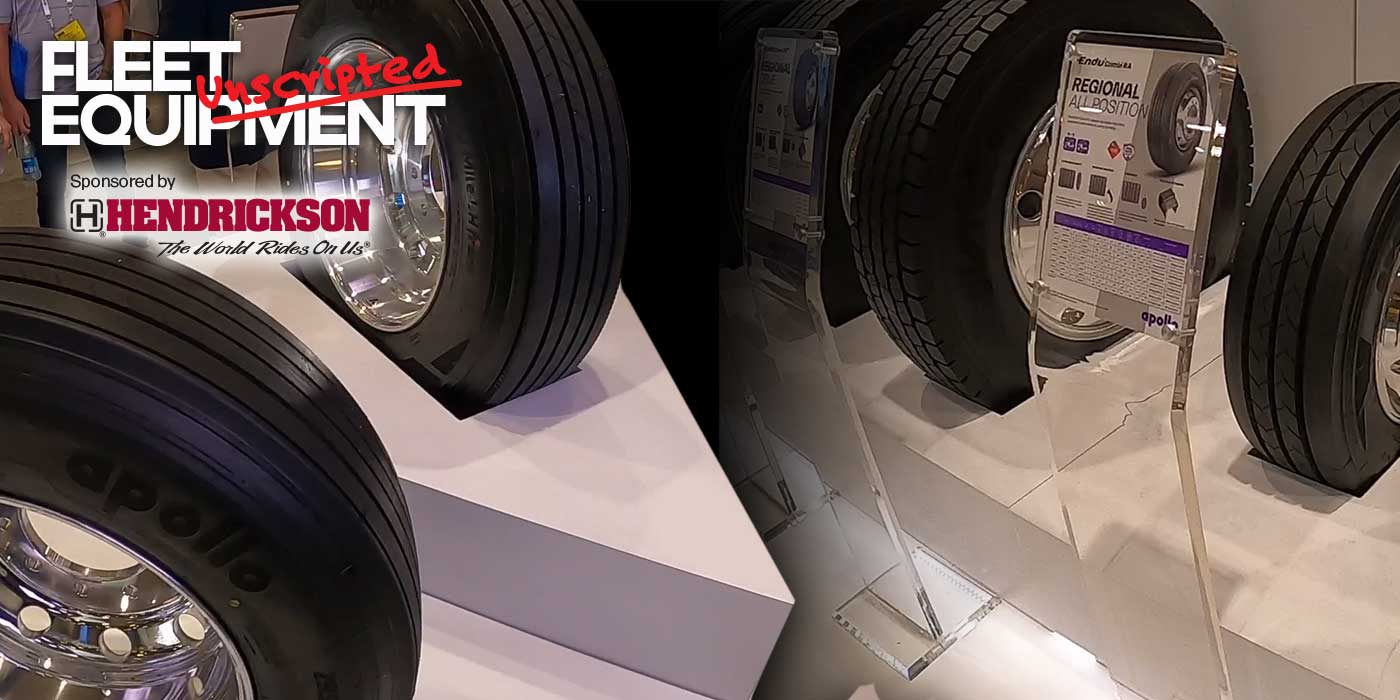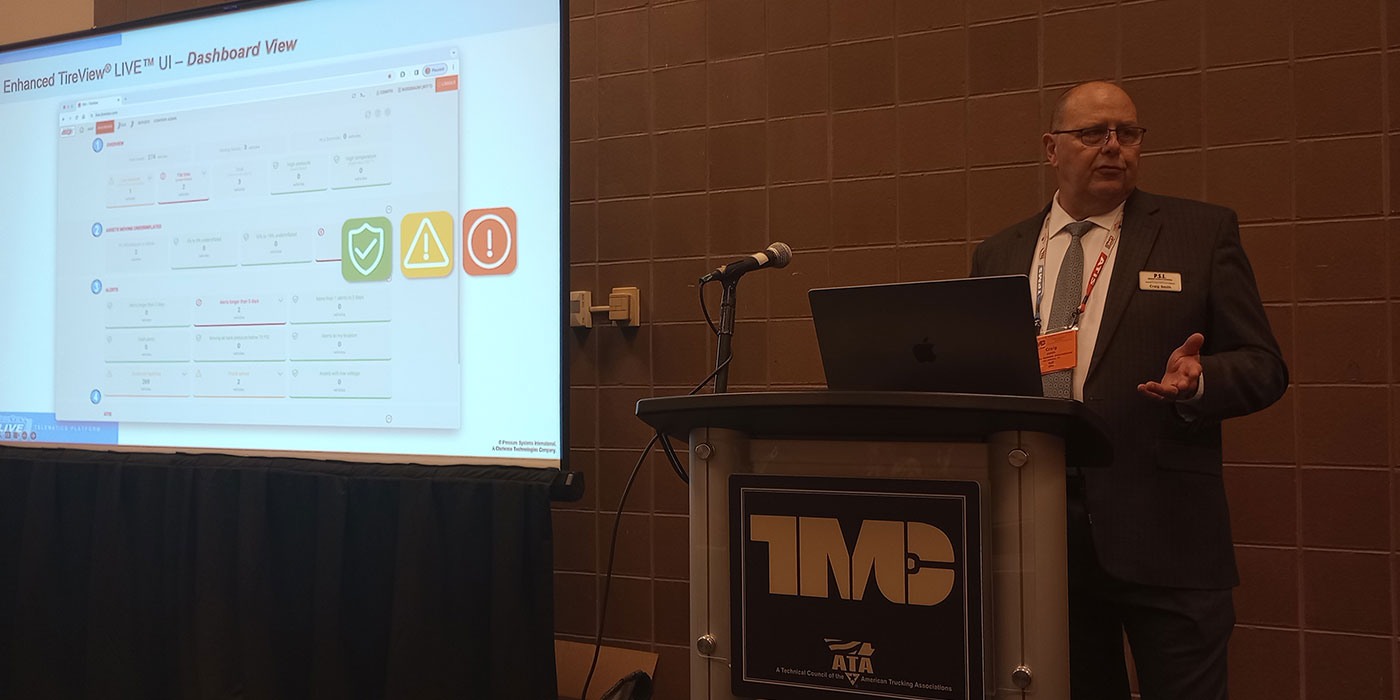One major focus of specification efforts in virtually every type of trucking operation, tires and related product and service issues continue to receive attention because they represent one of the highest single costs for fleets. Several factors in a tire’s design impact costs, especially as they relate to the fuel efficiency of heavy-duty combination vehicles.
Much of the rolling resistance of a tire, about 35% to 50% in many cases, comes from the tread, so its design can have a significant impact on fuel economy. Typically, shallow treads are more fuel-efficient than deep ones and rib designs tend to be more fuel-efficient than lug or block designs.
There are exceptions, though. Newer-generation drive tires, for example, feature continuous shoulder ribs. The result is that certain closed-shoulder drive tires offer overall fuel economy equal to or even better than some rib designs. While aggressive block-type treads with heavy siping have been associated with lower fuel efficiency, manufacturers are now using technologies that stabilize those blocks and lower rolling resistance.
Tread compounds also contribute to a tire’s fuel efficiency leading manufacturers to use different compounds in each tire to achieve lower rolling resistance and better fuel economy. A fuel-efficient compound typically has a higher rebound value. In the past, rubber compounds with this property might not wear very well but engineers have devised ways to improve rolling resistance without causing a significant loss in the other characteristics.
Across the board, manufacturers are producing fuel-efficient steer, drive and trailer tires. These tires are designed to reduce rolling resistance without sacrificing either durability or tread mileage. Using specialized synthetic rubber with engineered properties, together with a specific tread design, gives the best characteristics of long wear and fuel savings.
Wheels
Aluminum wheels offer weight and fuel savings to fleets, and in particular a growing number of fleets are now spec’ing wide base tires and wheels for drive and trailer axle positions. Wide base wheel and tire assemblies save fuel, in part because they include only half as many flexing sidewalls as a set of duals.
Actual weight savings with wide base aluminum wheels vary by manufacturer. Alcoa’s 14-in. wide base aluminum wheels, according to the company, can save 318 lbs. per axle or 1,272 lbs. per combination when used in place of dual wheels on drive and trailer positions. Accuride Duplex wide-base 22.5×14-in. aluminum wheels, the company notes, reduce fuel expense or increase payload capacity when used in place of traditional dual wheel sets on tandem-axle tractors and trailers.
Wide base tire offerings, manufacturers note, in addition to directly converting lower vehicle weight into payload, could also provide fuel economy advantages in comparison to conventional dual tire assemblies. Available today are Bridgestone Greatec drive and trailer tread designs in a 445/50R22.5 size, the Continental HTL1 trailer tire in a 445/50R22.5 version, the Goodyear 445/50 R22.5 G392 SSD drive model and Michelin X One wide single trailer and drive tires in 445/50R22.5 and 455/55R22.5 sizes.
Onboard inflation
Tire suppliers agree that fleets seeking improved fuel economy should look beyond the brand or design of their tires and also evaluate ways to improve their overall tire programs. This should include establishing maintenance programs and practices that maintain proper inflation, alignment and balance in order to maximize fuel efficiency.
On trailers in particular, a larger number of fleets are now utilizing on-board tire monitoring and inflation systems. Proper tire inflation saves money through improved fuel economy, longer tread life and improved retreadability, and less downtime caused by repairs.
At least half of fleet tire problems are caused by improper inflation, according to manufacturers, and the problem is more widespread than many fleets realize. The Federal Motor Carrier Safety Administration, for example, reports that only 44% of all truck tires are within 5 PSI of their target inflation (FMCSA PSV-04-0002).
Other studies show that approximately 20% of all tractor dual tire assemblies and 25% of all trailer dual tire assemblies differ in pressure by more than 5 PSI. Put another way, this pressure difference creates a 5/16-in. difference in circumference, causing the smaller tire to be dragged 13 ft. per mile, or 246 miles when driven 100,000 miles.
The Technology & Maintenance Council (TMC) also weighs in on this subject. Even as little as 20% under-inflation, according to TMC RP 235, causes tire casing life to be reduced by 30% and tread life to drop by 25%. Also, 20% under-inflation lowers fuel mileage by 1% to 2%.
Automatic tire inflation systems connect all tires on the trailer to a controlled air supply to fill and maintain tires at the desired pressure setting, even while the vehicle is moving. As air pressure drops below the tire manufacturer’s recommended level, air is automatically routed to refill any underinflated tires. Automatic tire inflation systems for trailers include Dana Spicer TIMS (Tire Inflation and Monitor System) for Trailers and the Meritor Tire Inflation System (MTIS) by PSI.
Operational advantages
Spec’ing tires, wheels and effectively ensuring that recommended inflation pressures be maintained is clearly a practice that leads to operational advantages for fleets.
For more information:
Accuride:
www.accuridewheels.com
Alcoa:
www.alcoawheels.com
ArvinMeritor :
www.meritorhvs.com
Bridgestone Americas Tire Operations: www.trucktires.com
Continental Tire North America:
www.continental-truck.com
Dana Spicer :
www.roadranger.com
Goodyear Tire and Rubber Co.:
www.goodyear.com/truck
Michelin Americas Truck Tires:
www.michelintruck.com
FE




